formerly eScholarship Editions


|
|
|
|
Your search for
'Classical Religions' in subject
found 26 book(s). | Modify Search | Displaying 21 - 26 of 26 book(s) | |
| 21. | 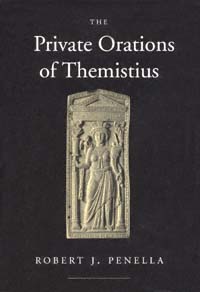 | Title: The private orations of Themistius Author: Themistius Published: University of California Press, 1999 Subjects: Classics | Classical Literature and Language | Classical History | Classical Politics | Classical Religions | Ancient History Publisher's Description: Themistius was a philosopher, a prominent Constantinopolitan senator, and an adviser to Roman emperors during the fourth century A.D. In this first translation of Themistius's private orations to be published in English, Robert J. Penella makes accessible texts that shed significant light on the culture of Constantinople and, more generally, the eastern Roman empire during the fourth century. The sixteen speeches translated here are equipped with ample annotations and an informative introduction, making them a valuable resource on the late antique period, as well as on Greek intellectual history and oratory.In Themistius's public orations, he played the role of imperial panegyrist, but in the "private" or unofficial orations presented here, the senator concerns himself with apologetics, rhetorical and philosophical programs, material of autobiographical interest, and ethical themes. The speeches are valuable as evidence for the political, social, philosophical, religious, and literary history of fourth century Byzantium, and as examples of pagan ideology and eloquence in the newly Christianized court. Themistius argues, among other things, that the philosopher should be involved in public affairs, that the lessons of philosophy should be broadcast to the masses, and that it is appropriate for the philosopher to be an effective orator in order to circulate his teachings. [brief] Similar Items |
| 22. | 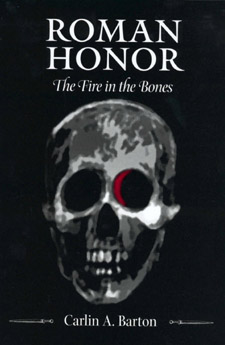 | Title: Roman honor: the fire in the bones Author: Barton, Carlin A 1948- Published: University of California Press, 2001 Subjects: Classics | Ancient History | Classical History | Classical Politics | Classical Religions | Comparative Literature Publisher's Description: This book is an attempt to coax Roman history closer to the bone, to the breath and matter of the living being. Drawing from a remarkable array of ancient and modern sources, Carlin Barton offers the most complex understanding to date of the emotional and spiritual life of the ancient Romans. Her provocative and original inquiry focuses on the sentiments of honor that shaped the Romans' sense of themselves and their society. Speaking directly to the concerns and curiosities of the contemporary reader, Barton brings Roman society to life, elucidating the complex relation between the inner life of its citizens and its social fabric. Though thoroughly grounded in the ancient writings - especially the work of Seneca, Cicero, and Livy - this book also draws from contemporary theories of the self and social theory to deepen our understanding of ancient Rome. Barton explores the relation between inner desires and social behavior through an evocative analysis of the operation, in Roman society, of contests and ordeals, acts of supplication and confession, and the sense of shame. As she fleshes out Roman physical and psychological life, she particularly sheds new light on the consequential transition from republic to empire as a watershed of Roman social relations. Barton's ability to build productively on both old and new scholarship on Roman history, society, and culture and her imaginative use of a wide range of work in such fields as anthropology, sociology, psychology, modern history, and popular culture will make this book appealing for readers interested in many subjects. This beautifully written work not only generates insight into Roman history, but also uses that insight to bring us to a new understanding of ourselves, our modern codes of honor, and why it is that we think and act the way we do. [brief] Similar Items |
| 23. | 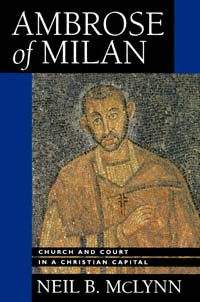 | Title: Ambrose of Milan: church and court in a Christian capital Author: McLynn, Neil 1960- Published: University of California Press, 1994 Subjects: Classics | History | Classical Religions | Christianity | Ancient History | Autobiographies and Biographies Publisher's Description: In this new and illuminating interpretation of Ambrose, bishop of Milan from 374 to 397, Neil McLynn thoroughly sifts the evidence surrounding this very difficult personality. The result is a richly detailed interpretation of Ambrose's actions and writings that penetrates the bishop's painstaking presentation of self. McLynn succeeds in revealing Ambrose's manipulation of events without making him too Machiavellian. Having synthesized the vast complex of scholarship available on the late fourth century, McLynn also presents an impressive study of the politics and history of the Christian church and the Roman Empire in that period.Admirably and logically organized, the book traces the chronology of Ambrose's public activity and reconstructs important events in the fourth century. McLynn's zesty, lucid prose gives the reader a clear understanding of the complexities of Ambrose's life and career and of late Roman government. [brief] Similar Items |
| 24. | 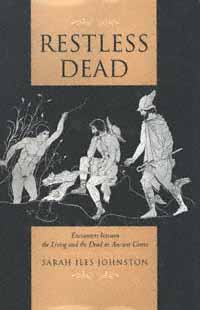 | Title: Restless dead: encounters between the living and the dead in ancient Greece Author: Johnston, Sarah Iles 1957- Published: University of California Press, 1999 Subjects: Classics | Classical Religions | Classical Literature and Language | Intellectual History | Folklore and Mythology | Cultural Anthropology Publisher's Description: During the archaic and classical periods, Greek ideas about the dead evolved in response to changing social and cultural conditions - most notably changes associated with the development of the polis, such as funerary legislation, and changes due to increased contacts with cultures of the ancient Near East. In Restless Dead , Sarah Iles Johnston presents and interprets these changes, using them to build a complex picture of the way in which the society of the dead reflected that of the living, expressing and defusing its tensions, reiterating its values and eventually becoming a source of significant power for those who knew how to control it. She draws on both well-known sources, such as Athenian tragedies, and newer texts, such as the Derveni Papyrus and a recently published lex sacra from Selinous.Topics of focus include the origin of the goes (the ritual practitioner who made interaction with the dead his specialty), the threat to the living presented by the ghosts of those who died dishonorably or prematurely, the development of Hecate into a mistress of ghosts and its connection to female rites of transition, and the complex nature of the Erinyes. Restless Dead culminates with a new reading of Aeschylus' Oresteia that emphasizes how Athenian myth and cult manipulated ideas about the dead to serve political and social ends. [brief] Similar Items |
| 25. | 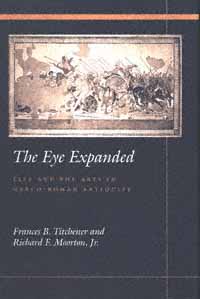 | Title: The eye expanded: life and the arts in Greco-Roman antiquity Author: Titchener, Frances B 1954- Published: University of California Press, 1999 Subjects: Classics | Classical History | Classical Literature and Language | Art and Architecture | Classical Politics | Classical Religions | Ancient History Publisher's Description: Plato and Aristotle both believed that the arts were mimetic creations of the human mind that had the power to influence society. In this they were representative of a widespread consensus in ancient culture. Cultural and political impulses informed the fine arts, and these in turn shaped - and were often intended to shape - the living world. The contributors to this volume, all of whom have been encouraged and inspired by the work of Peter Green, document the interaction between life and the arts that has made art more lively and life more artful in sixteen essays with subjects ranging from antiquity to modern times.With topics ranging from Antigone to D. H. Lawrence and Norman Douglas, and from Bactrian coins to Livy's characterization of women, the scope, the zest, and the scholarship of these essays will illuminate new avenues in our understanding of the relationship between classics and culture, and in our appreciation of both the artistic products that have come down to us and the varieties of life from which they spring. [brief] Similar Items |
| 26. | 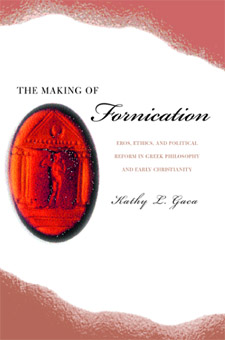 | Title: The making of fornication: eros, ethics, and political reform in Greek philosophy and early Christianity Author: Gaca, Kathy L Published: University of California Press, 2003 Subjects: Classics | Classical Philosophy | Classical Religions | Classical Politics | Christianity | Ethics | Social and Political Thought | Ancient History | Intellectual History Publisher's Description: This provocative work provides a radical reassessment of the emergence and nature of Christian sexual morality, the dominant moral paradigm in Western society since late antiquity. While many scholars, including Michel Foucault, have found the basis of early Christian sexual restrictions in Greek ethics and political philosophy, Kathy L. Gaca demonstrates on compelling new grounds that it is misguided to regard Greek ethics and political theory - with their proposed reforms of eroticism, the family, and civic order - as the foundation of Christian sexual austerity. Rather, in this thoroughly informed and wide-ranging study, Gaca shows that early Christian goals to eradicate fornication were derived from the sexual rules and poetic norms of the Septuagint, or Greek Bible, and that early Christian writers adapted these rules and norms in ways that reveal fascinating insights into the distinctive and largely non-philosophical character of Christian sexual morality. Writing with an authoritative command of both Greek philosophy and early Christian writings, Gaca investigates Plato, the Stoics, the Pythagoreans, Philo of Alexandria, the apostle Paul, and the patristic Christians Clement of Alexandria, Tatian, and Epiphanes, freshly elucidating their ideas on sexual reform with precision, depth, and originality. Early Christian writers, she demonstrates, transformed all that they borrowed from Greek ethics and political philosophy to launch innovative programs against fornication that were inimical to Greek cultural mores, popular and philosophical alike. The Septuagint's mandate to worship the Lord alone among all gods led to a Christian program to revolutionize Gentile sexual practices, only for early Christians to find this virtually impossible to carry out without going to extremes of sexual renunciation. Knowledgeable and wide-ranging, this work of intellectual history and ethics cogently demonstrates why early Christian sexual restrictions took such repressive ascetic forms, and casts sobering light on what Christian sexual morality has meant for religious pluralism in Western culture, especially among women as its bearers. [brief] Similar Items |